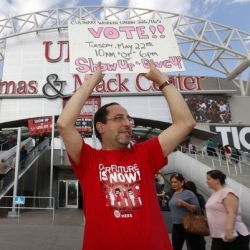Las Vegas casino workers voted to approve a strike, which could happen on the 1st of June. Collectively-bargained contracts for over 50,000 workers end on the final day of May.
The strike by the Culinary Union could affect dozens of casinos and resorts in the Las Vegas area. The union members showed a high degree of solidarity, as 99% of the 25,000 workers on hand voted to authorize a strike.
While the vote authorizes the Union Negotiating Committee to call a strike anytime after June 1, that does not mean a strike will happen. Union leaders were quick to say they wanted to resolve their differences with casino management before a strike was called.
Many union members believes a 99% vote to authorize a strike gives their negotiators a stronger hand in negotiations and thus a better chance to secure demands while forestalling a strike.
“Strike Is a Last Resort”
Geoconda Argüello-Kline, secretary-treasurer and spokesman for the Culinary Union, said in a statement, “A strike is a last resort. We want to come to an agreement, but the union and workers are preparing for a citywide strike if contracts are not settled by June 1.”
The strike would bring hotel services to a halt. Bars and restaurants would have to shut down. Casino gaming spaces would lack drink service and other amenities. A strike would put casinos in a bad situation heading into the summer rush.
Strikes Have Unpredictable Outcomes
It is no minor consideration. If the union went on strike, it would be the first strike by Las Vegas casino workers since 1983. That strike last for over 75 days and cost the union members $70,000,000.
When workers at the Trump Taj Mahal staged a strike on Fourth of July Weekend in 2016, the resulting three-week strike caused owner Carl Icahn to close the casino altogether. All members of the Local 54 of UNITE-Here lost their jobs.
Las Vegas casinos will not take such drastic measures, but it underscores how unpredictable labor strife can be. MGM Resorts, Caesars Entertainment, and Tropicana Las Vegas own most of the casinos involved in the current negotiations. Those casino companies have a good history of maintaining good labor relations.
Lost Revenues, Lost Wagers in Summertime
The strike comes at a bad time. The Las Vegas sportsbooks are preparing for the NBA Finals and NHL Finals. June and July should see a surge of betting on European football, as the 2018 World Cup in Russia takes place from mid-June to mid-July. The strike also would concide with the beginning of the 2018 World Series of Poker.
The WSOP brings an influx of amateur poker players and their families to Las Vegas, while June is the beginning of the summer surge of vacationers. This is the time of the year Las Vegas resorts swell with customers, so it would be a bad time for casino operations to shut down due to a strike.
Union Workers Demands
The Culinary Workers Union Local 226 includes room attendants, servers, bartenders, cooks, and kitchen workers at 34 local casinos. The union members want new language involving protections from sexual harassment by supervisors and patrons alike. The Culinary Workers Union also wants assurances against job-killing technological upgrades and the use of subcontractors.
The first two involve job-saving measures. Casinos can hire subcontractors for cheaper, because they do not have to pay health and pension benefits. Many companies have used their tax breaks to invest in technology that will cost US workers jobs, so the union wants to guard against that.
Protection against Harassment
Casino companies might find it harder to agree to the sexual harassment protections. While it makes sense that female workers would want such protections in the “Me Too” era, it is hard to enforce such policies. All companies should have policies against management harassment, but it is customer relations which are so tricky.
As a rule, casinos try to cater to their customers — especially VIP high-rollers. If a high stakes gambler is accused of harassing employees, management has to offend or run-off a major customer. The stories of resorts catering to VIPs are legendary and they seldom involve the resort management going out of their way to offend the high rollers.

